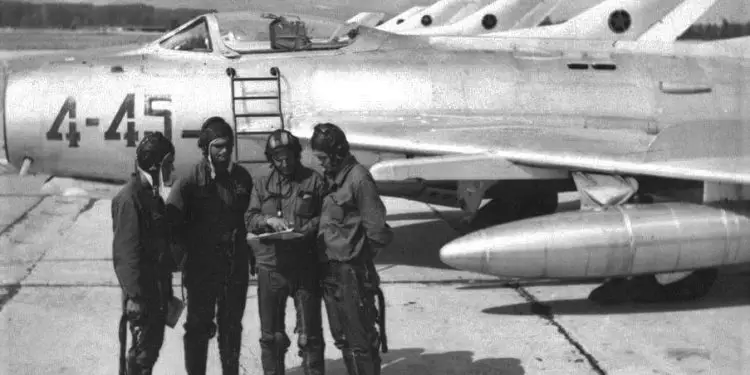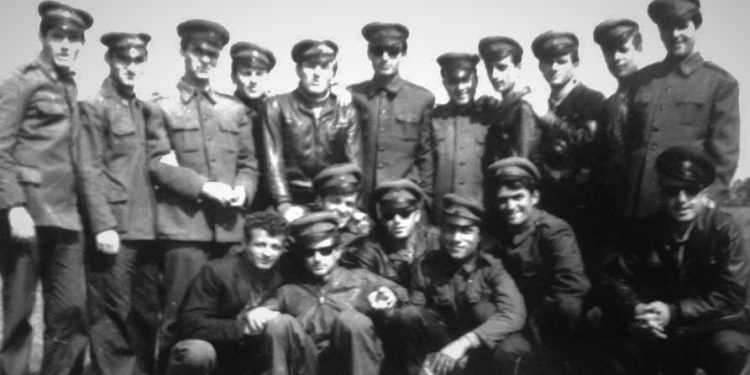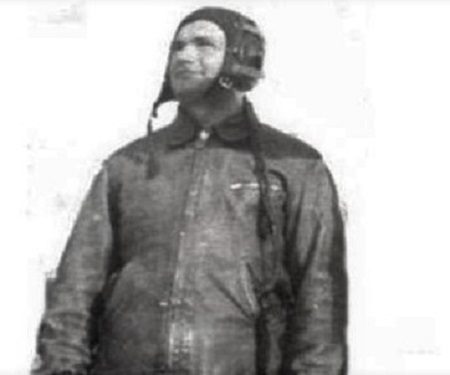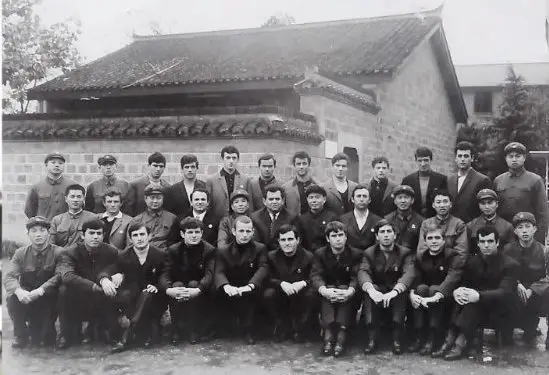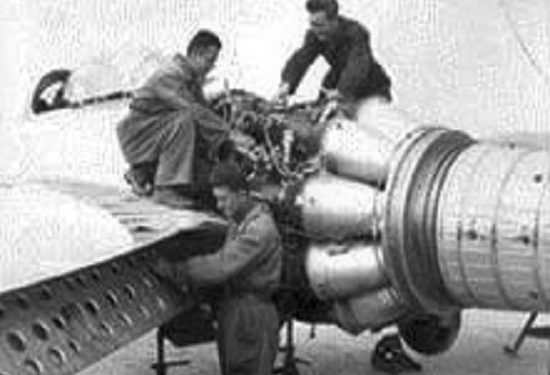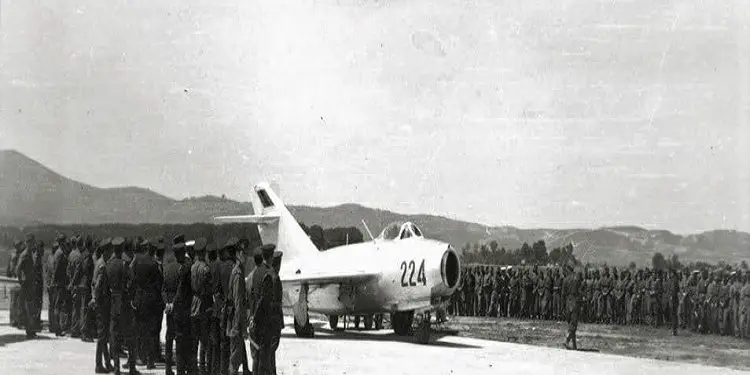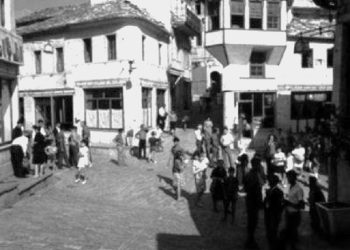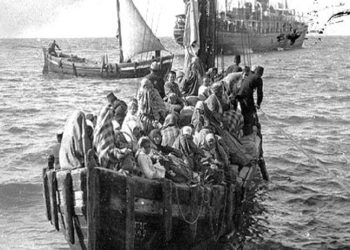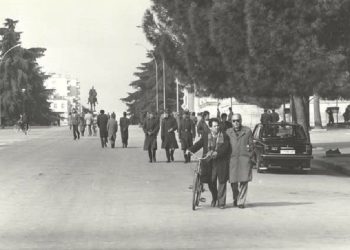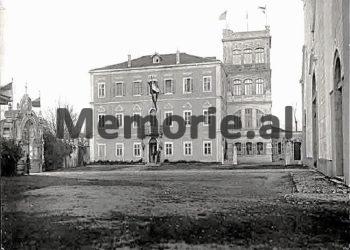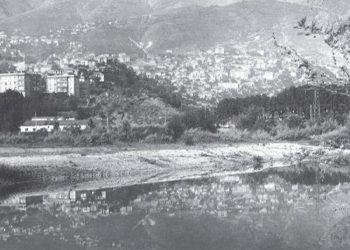By Niazi Nelaj
The fifth part
– At the Chinese Military Aviation School –
Memorie.al / Expelled from the Soviet School of Aviation, with dreams cut in half, part of the group of student pilots, who had studied for a year in the city of Bataysk, on January 8, 1962, after a “hell” cruise ”, with a cargo ship, we arrived at the center of China’s Third Military Aviation School in Chin Zhou City. It is located in the “heart” of Manchuria; at that time there were about 200,000 inhabitants. Without any prominent industry. A city with 2-3 story buildings but paved roads. The terrain around the city was plain; next to it are the Western shores of the Yellow Sea. One of the values of this city was the fact that it was the center of China’s Third Military Aviation School. My going to this school and that city was a lucky chance. In the list of 7 students of our course, which included: Adem Çeça, Dhori Zhezha, Mihal Pano, Bashkim Agolli, Andrea Toli and Sherif Hajnaj (Bracki), my name, Niazi Nelaj, was included, quite by chance.
Continues from last issue
It seems that in these memories I have learned more about the negative sides. I oppose, even categorically, such a judgment. Life has two sides, side by side and they cannot be separated from each other, because they lose their meaning. In this article, if I have listed some not so pleasant things, I assure you that as far as I remember and as much as I can, I want to highlight the real life of people; without blackening it; but also without polishing it. Memories and impressions are information about things that I have experienced individually.
If in any case their description gets negative emphasis, I cannot take the blame. I have written the problems and said them bluntly, with the language they have and with indisputable truth. Let’s keep in mind that at the time when my friends and I lived learned and flew in the China of those years; things were not as we see them today. China, especially in recent times, has made so much progress that it can be ranked; in some respects it even surpasses the level of the most developed countries of the globe.
I write what I have seen and experienced in those years. The 50 years that have followed have brought changes by leaps and bounds in the economy, science, technique, and technology and in increasing the well-being of the people of that giant country. Let everyone make the comments according to the position they have chosen; I speak only the truth, as it was; for this I answer.
What I am going to tell you may seem impossible, but I assure you that it was so. Several times we had asked those who organized our living, to take us to a Chinese family, to see closely the life of those people. We never received a response to our request. We could not find out the reasons for the rejection. Then, together with my friends, as we had made the order with the school authorities, we decided to go to a city cinema, to see a new movie of Indonesian production, which had caused a stir.
The superintendent of the school provided us with tickets; The translators were not shared with us in this case either. We entered the cinema and asked to sit in the seats where we had the ticket. The cinema spaces were very crowded. Our imaginations couldn’t handle that crap. All the chairs were occupied. Only our seats were empty. On the other hand, they respected the ticket. There we saw people sitting in the spaces that divided the ranks, on the stairs, between the lodges wherever they could. As many seats as there were, they were seated; others were standing and watching the film, just like that.
People, in the cinema, not only sat as they pleased, but also behaved as they saw fit. They smoked cigarettes, spat on the ground, talked, let out some p…., with or without sound, without saying anything, etc. Breathing in that overcrowded and chaotic environment. Once, in the cinemas of the city of Vlora, but not only, you could not watch a movie. Some boys who had seen the film, already in the first sequences, started the story of the film and it seemed useless, there was no interest in staying in the cinema any longer.
Then the loud comments started. At least in the cinemas of the Chinese, people stayed calm. Except one thing was wrong with our mentality. In the cinema, in the city where we lived, people went to see a movie, not as many people as there were seats in the hall, but as many people as were in front of the cinema, on the street. I was surprised and saddened by that unprecedented sight.
One day, I had the chance to talk with a Chinese pilot. At the school, apart from the flight instructors, the other officers, including the pilots, trained and lived apart from us. The pilot I spoke to was young, healthy, tall, broad-shouldered, about 26 years old; single I said to the interlocutor: “Why don’t you get married, Xiao Li?” He did not hesitate at all to answer me, he even said with sincerity: “I will get married, when we liberate America”!
I got the answer I was looking for. This is what the propaganda of the time taught him. What I saw later, in that garrison, convinced me that the pilot I talked to was serious. Some rules of behavior related to marriage and family were strict and mandatory in those years. Soldiers could marry after reaching the age of 28.
No couple could have more than 2 children. A military man and his wife could sleep together only on Saturday; on other days, even if they lived in the same garrison, they slept separately. The military man slept in the shed to be ready at all times. I will also tell you something that seemed original and inconceivable to me:
Many officers were married, but their wives worked and lived several hundred, perhaps more, miles away. The adjutant of the garrison, at the beginning of the year, drew up a chart, as charts were made in our country, for the ordinary leaves of the officers. The wife of every soldier in the garrison could come next to her husband and stay a few days or weeks (1-3 weeks) in the ward, but she would sleep with her husband only on Saturday.
For this purpose, in the territory of the garrison, several buildings were built, as warehouses of our army in the opening points, where the couples used to sleep, without any comfort. In rooms of this type, I had seen a double bed, a wardrobe, a table, two chairs and a mirror on the wall. The union of the couple took place strictly according to certain rules, only on Saturdays. Contraceptives, at that time, were sold freely, found everywhere and cost quite cheap.
Marriage ties and weddings among the Chinese were quite interesting. Within the garrison, I happened to be a participant in several such. The commissar of the department, who in the unit he led, had several single officers, used to go to an enterprise where unmarried girls worked. There he met the secretary of the party; they both talked and came to an agreement to make “affinity”. If the two commissioners decided, who guarantors for the young people became, the relationship was complete. I don’t know if the two young men met, knew each other and talked to each other.
I was present, together with my friends, at a wedding where the groom was a soldier and the bride, a worker from the city’s enterprises. On the day agreed upon by the “bosses”, the wedding was organized. The place where the wedding ceremony took place was usually the party room. It is about the Communist Party of China. The rites of the wedding ceremony were simple and interesting. For us, they were unseen and unheard of.
The Party Room was cleaned and arranged for the wedding ceremony. Tables and chairs were placed around the hall, in a row. At the front of the hall, the portrait of Chairman Mao Zedong was placed. At the central table sat the bride, the groom, the commissar of the department, the party secretary of the company and some others, chosen from both sides. We, the Albanians, were placed together, on one side.
All the participants were dressed in their best, clean uniform and their faces were smiling and happy. The bride was dressed, depending on the occasion, in trousers and blouse (jacket), or in a sweatshirt (in winter). The groom, always in military uniform. It was not customary for the bride to wear a white dress. Such a thing entered into the nuances of bourgeois behavior. Several plates (plates) of roasted, unshelled peanuts were placed across the tables.
One of the commissars started the wedding ceremony. He emphasized that this marriage was concluded according to the orders and teachings of Chairman Mao Zedong, who, among the main orders for the woman, in the quotes with red caps, emphasized: “Don’t fall on the woman’s neck”! Parts of the quotes were read; everyone laughed, shouted and applauded. The couple was declared married when the “rite” of reading Mao Zedong’s quotes was finished.
The newlyweds did not kiss or hug. They didn’t even touch their hands, but, according to the Chinese tradition, they extended both hands, kissed the soles of their hands and bowed, in honor of their husbands. Applause erupted, the participants in the ceremony ate peanuts and thus the wedding ended. The groom had the right to sleep with the bride, according to the general rule, only on Saturdays. On the other days of the week, the practice was applied: “See with your eyes and crack, with your heart”! It was not about gifts, exchange of rings and other “excesses”, which were labeled as a bourgeois way of living.
In the military garrison, where we lived and trained, the conditions for having fun and relaxing were limited. We were all young. Our average age did not exceed 21 years. We lived far from our families, from well-known Albanian environments. We longed for our people and for the society we had left behind. We were pampered by life in a more developed and civilized country, such as the then Soviet Union. The aerial training was exhausting and the theoretical lessons were not so easy.
Our intellectual demands required quality, continuous entertainment activities, which, to put it bluntly, were quite limited. In practical life we had enough “fences” and obstacles. With us it happened like with those children, who have just stood up and the mother tells them: “Don’t do that, don’t touch that, there is dirty and there is xix” etc. limiting his freedom through strict control.
Television was in its infancy; we didn’t have any television set at school. The Chinese radio broadcast announcements that we did not understand, while the music of the locals did not stick to us. When we were in Batajsk, every Saturday we went to dance evenings, where the girls would wait in line, because there were few boys. We tried to go to a cinema, as I have described above, and there we were not impressed by what we saw.
Such rich folklore groups and the phenomenal, Chinese circus, never visited our city, while we did not have the opportunity to watch sports events. I can say that our spiritual life was poor and limited. Under those conditions, we were forced to invent something ourselves, with our own strength, at the levels and opportunities we had. In the first half of 1962, Communist China was in armed conflict with bordering India.
The conflict had flared up over the Kashmir issue. Each of the two bordering countries claimed that the territories in question belonged to it. They could not find him with words and turned their armies against each other. Fighting took place on the border between the two neighboring countries and people lost their lives. Manchuria, where we lived, was far from the place of conflict, and the echo of the fighting came to us only through the press, which we did not know how to read. We didn’t even understand the announcements given by the Chinese radio.
We received information on the development of events indirectly, through Russian stations, according to their point of view and interests. However, the announcements, until they reached us, were wrapped up in the long journey. Of course, we sided with the Chinese by giving them justice. To make the locals happy (take the motives as you like), spontaneously, on the initiative of the pilot student, Enver Muça, from Tirana, we created a funny skit for the residents of the military garrison.
The protagonist of the skit, the smart and resourceful tyrant Enver Muça, was stripped and smeared with mud to look like an Indian. North, just like that, smeared with mud, came out in front of the people, making numbers, as if scared. He spoke words, in vain, supposedly in the Hindi language. The participants, who were mostly Chinese, laughed and had a lot of fun. Ver’s comedy number, his unknown talent, we also liked.
Exalting the artistic values of our friend, the school authorities and the large audience asked for the repetition of the humorous number and it was repeated, through the applause and cheers of the crowd.
A cinema with about 500 seats operated in our garrison. We went there every time an artistic ensemble came and for various political and festive activities. As foreigners who were in that environment, the locals, to respect us, put us in the first ranks. We had a difficulty, which we gradually adapted to. The Chinese ate mostly herbs. For this reason, during breathing, they released different smells in the common environments.
At the cinema, in the canteen and in other environments, at first we were breathless. By feeding ourselves with herbs, like them, we gradually did not feel the heavy smell so much. When we took the way back to Albania, during all the sailing days (about 20 days and nights), we kept candy and peppermint in our mouths, to remove the bad breath from our mouths.
We used to go with great pleasure to the cinema of our garrison, to spend a few moments of relaxation. Someone told our friend from Durrës, Dalip Xixha, who was not known for his intelligence, that he had a good voice and could sing. It filled Dapa’s mind that he could sing in public and, one day, he appeared on the stage of the cinema, with a microphone in his hand. The audience in the hall burst into applause and cheers, before Dalipi even opened his mouth.
Apparently, the locals gave the problem a political color: an Albanian student would sing, solo, on such a big stage. Our Dapja took courage and began to sing a song, in English (she said in vain that she did not know the English language), which, at that time, was in fashion; “Diana”. Dalipi, with a voice that was trying to make it “shrill”, was making more noise than singing. However, the locals applauded and accompanied the song with cheers.
It didn’t matter at all, how the “singer” sang; of value was his being from Albania, a friend of China. To ironize his action, one of our friends filled the blackboard at the bottom of the steps of the apartment with some couplets and a caricature of Dapja singing. We looked at that creation, every time we went up and down the stairs and laughed heartily. He looked at him and Dalip laughed at him without thinking.
We were together with the group of tourists who came from Krasnodar. They were probably 20 students, in their society there were problems of relations with each other. Among them were two students: Ivzi Minxha, from Pogradeci and Kozma Sinjari, from Berat. Both petite and belligerent. Their group mates enjoyed “pitting” them against each other. Clashes between them went up to physical conflict.
Their teammates, split in two, cheered, some for one and others for the other, like in a boxing match. I emphasized this aspect of our life, just to show that we also contrive such conflicting actions, just to relax a little. To spend our free time we played with a ball, on the only football field; whereas indoor gaming halls were non-existent.
From time to time we went out into the city. It is enough to pass the school checkpoint and change the environment a little. I say so, because the places where we could go were defined. We entered a store and moved around the city with restrictions. Clubs, in the sense of cafeterias, restaurants, billiards, cinemas, etc., places to have fun, we didn’t know and we couldn’t go to them. At that time in China, the voucher system worked. In stores, you can buy, without any hassle, only industrial items.
Every commodity produced with agricultural or livestock material was exchanged for voucher. Although we had insufficient money in our pockets, our purchases were difficult, also because of the tolls. Even soap or toothpaste was exchanged for voucher. In the stores inside the garrison, we did not always find the articles we needed; that’s why we were in the city. We mostly frequented a type of supermarket, with three floors, which was located in the center of the city.
The purpose of frequent visits to that supermarket was twofold. With the little money we saved, we bought a few pairs of socks, nylon or silk, which were sold without tolls and did not cost much. The socks would serve as a gift for our family and relatives when we returned to Albania. The special motive that led us to that shop was the presence of a young, very beautiful saleswoman.
We often went to that unit, stayed for a long time, surrounded the beautiful girl and did not take our eyes off her. We observed the graces of her girlish beauty, to break the monotony of the first, non-stop green color of clothing with military pants and sweatshirts. The beauty of Chin Zhou piqued our interest in her and, like the beauty that she was, flattered and smiled gracefully, enticing us with her graces.
Our long stay in that store did not go by without catching the eyes of the curious and very jealous locals, who identified us from afar, from our appearance and the big nose we had. One day we did not find that beautiful woman in the store. They had sent him away, with stunts. Thus, for us, there was also a motive to go out into the city. After the beautiful saleswoman left the workplace, we painfully realized that we had all fallen in love with her. Let’s face it, it’s about platonic love. None of us had touched that woman. Memorie.al
The next issue follows




